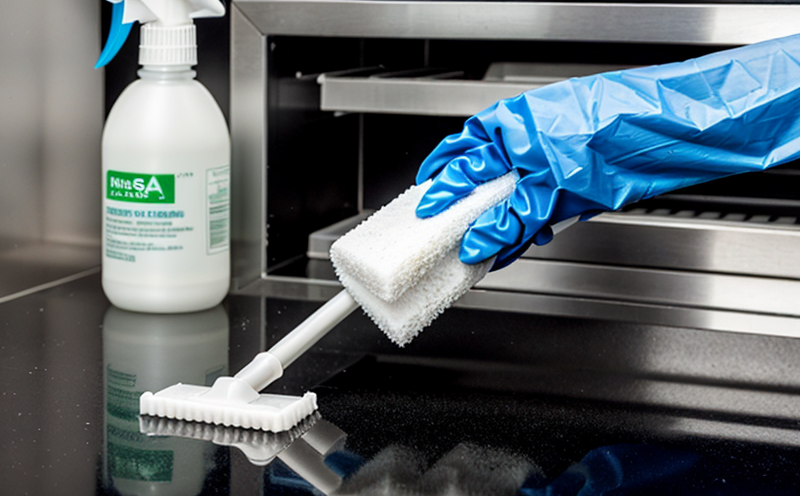DIN EN ISO 1924 Resistance to Fungal Growth on Plastics
The DIN EN ISO 1924 standard specifies a method for determining the resistance of plastics to fungal growth. This test is particularly important in sectors where materials are exposed to moisture and organic matter, such as medical devices, food packaging, and outdoor furniture.
The testing process involves placing specimens of plastic on a nutrient agar medium that supports fungal growth. The specimens are incubated under controlled conditions for a specified period, after which the extent of fungal colonization is visually assessed and quantified. This test helps manufacturers ensure that their products can withstand environmental exposure without compromising safety or performance.
One of the key challenges in this testing process is ensuring that the nutrients provided to the fungi are optimized to promote growth while still being representative of real-world conditions. The standard specifies the use of a specific type of nutrient agar, which must be carefully prepared and maintained throughout the test cycle.
The test procedure also involves rigorous specimen preparation, including cleaning, drying, and conditioning the plastic samples prior to testing. This step is critical because any contamination or imperfections in the sample could skew the results. The specimens are then precisely cut to standardized dimensions before being placed on the agar medium.
During the incubation period, environmental conditions such as temperature, humidity, and light exposure must be strictly controlled. These factors can significantly influence fungal growth rates and patterns, making accurate control essential for consistent test results.
The evaluation of the test involves both visual inspection and quantitative analysis. The extent of fungal colonization is measured in terms of the percentage of the specimen surface covered by fungi. This measurement provides a clear indication of the plastic's resistance to fungal attack. Additionally, the type and variety of fungi observed can also provide insights into the specific environmental conditions that the material must withstand.
Understanding the results of this test is crucial for product developers and quality assurance teams. It allows them to make informed decisions about material selection and formulation, ensuring that products meet regulatory requirements and perform reliably in their intended applications.
Eurolab Advantages
Eurolab offers unparalleled expertise in DIN EN ISO 1924 testing, providing clients with a comprehensive range of services tailored to the unique needs of each project. Our team of experienced professionals ensures that every test is conducted rigorously and accurately, adhering strictly to international standards.
We pride ourselves on our state-of-the-art facilities, which are equipped with advanced instrumentation and equipment capable of delivering precise and reliable results. Our laboratory is certified to ISO/IEC 17025:2017, ensuring that all tests meet the highest quality requirements.
Our experienced staff includes chemists, microbiologists, and engineers who have extensive experience in polymer and plastics testing. They are committed to providing clients with expert advice and support throughout the testing process, from initial consultation to final report delivery.
We offer flexible service options, allowing clients to choose the level of detail they require for their specific needs. Whether you need basic compliance testing or more comprehensive analysis, Eurolab can meet your requirements. Our commitment to excellence and customer satisfaction ensures that every project is handled with the utmost care and precision.
Why Choose This Test
The DIN EN ISO 1924 test is essential for ensuring that plastic products are resistant to fungal growth, particularly in environments where moisture and organic matter are present. This resistance is crucial for maintaining the integrity and performance of the product over its lifecycle.
Fungi can cause significant degradation of plastics, leading to a loss of mechanical properties, color changes, and even structural failure. By conducting this test, manufacturers can identify potential issues early in the development process, allowing them to make necessary adjustments to their formulations or production processes.
The test results provide valuable insights into the performance of different plastic materials under controlled conditions. This information is invaluable for R&D teams looking to innovate and improve existing products, as well as for compliance officers ensuring that products meet regulatory requirements.
Moreover, the DIN EN ISO 1924 test helps manufacturers differentiate their products in a competitive market by demonstrating superior resistance to fungal growth. This can be a key selling point, especially for high-value applications like medical devices and food packaging.
Customer Impact and Satisfaction
The results of the DIN EN ISO 1924 test have a direct impact on customer satisfaction by ensuring that products perform reliably over their intended lifecycle. By demonstrating resistance to fungal growth, manufacturers can build trust with their customers, knowing that their products will withstand environmental exposure without degradation.
For quality managers and compliance officers, the test results provide critical data for decision-making processes. They can use these insights to ensure that products meet strict regulatory requirements, thereby minimizing the risk of non-compliance and potential recalls.
R&D engineers benefit from this testing by gaining a deeper understanding of the materials they are working with. This knowledge allows them to make informed decisions about material selection and formulation, leading to innovative product designs that are both functional and sustainable.
Procurement teams can leverage the test results to source high-quality materials that meet stringent standards. By ensuring that suppliers deliver products that pass rigorous testing, procurement officers contribute to the overall quality of the final product.





